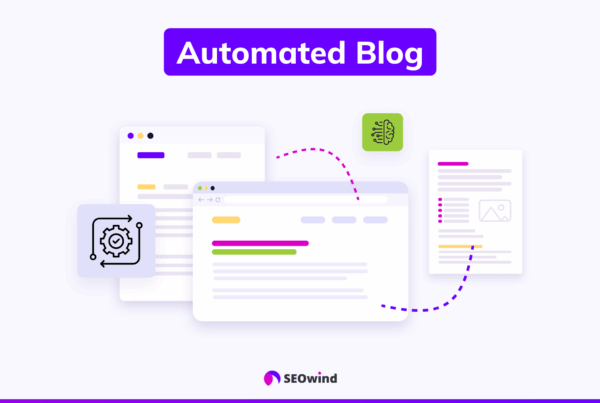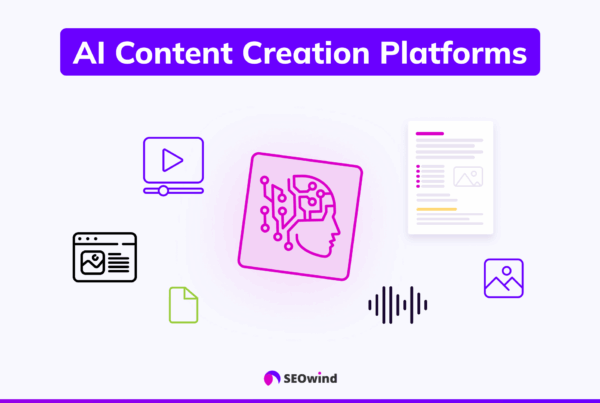In the digital era, where content marketing is king and blogs constitute a dominant part of this kingdom, a blog post writer’s role has taken center stage. However, even this field isn’t exempt from the rippling effects of technological advancements, particularly Artificial Intelligence (AI). The impact? A paradigm shift in content creation with professional blog writers wielding AI tools to level up their game.
Now imagine a blend of human creativity with machine intelligence. This intriguing partnership paves the way for more posts with quirky metaphors or robust arguments generated by humans accompanied by AI’s speedy data-crunching abilities. This article gives you a deep dive into how professional AI has morphed blog post writing and how you can potentially use AI-powered tools such as SEOwind to get superpowers as a blog post writer.
What is a Blog Post Writer?
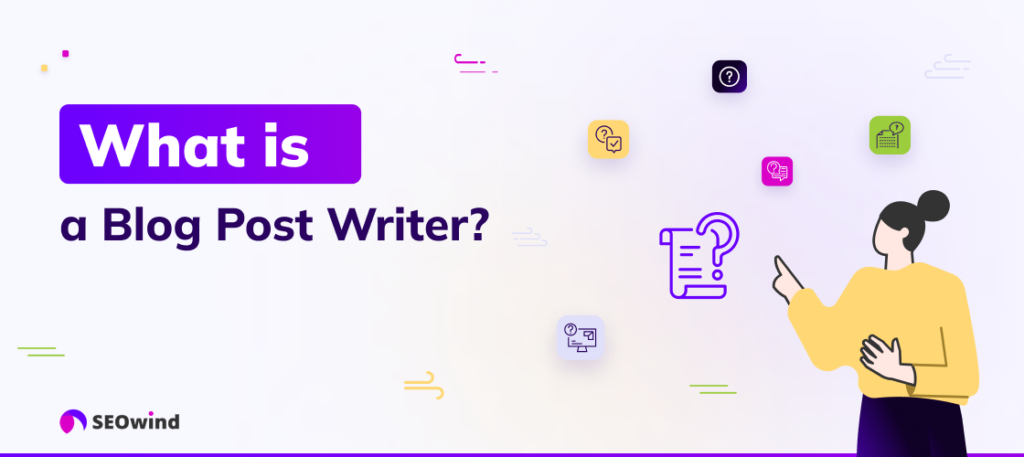
At its core, a blog post writer is akin to an online artisan—crafting articles with expertise in numerous subjects ranging from technology reviews to gardening tips. They possess great mastery in spinning informational narratives, which balance factual accuracy with engaging storytelling. But it doesn’t stop there; now, they are increasingly equipped with insights aided by complex algorithms provided by artificial intelligence tools.
Writing does not merely end with typing words out. Good blog writers also function as researchers, investigating their topic thoroughly before wrapping it within layers of elegant prose. Plus, they ensure that their well-crafted pieces efficiently reach their targeted reader base through SEO optimization and social media knowledge.
Whether you refer to them as “articles writers” or just “blog writers,” professionals combine their skills and smart tech to carve an informative piece and deliver an enjoyable and lasting reading experience.
A blog post writer is the mastermind behind creating engaging, informative, and SEO-rich articles to captivate readers on various digital marketing platforms. They accomplish this work by undertaking several distinctive roles.
- Research: A deep and thorough research process is at the heart of every great blog. Unsurprisingly, blog writers spend a good chunk of their time brushing up on existing knowledge about the topic they’re covering – from browsing sources for current trends to gathering data or statistics. The author sometimes uses tools like Articly AI to simplify this task.
- Content Creation: The primary role of a blog post writer is, of course, writing the actual content. This involves arranging thoughts in an organized manner and crafting sentences that are not only accurate but also engaging and easy to understand.
- SEO Optimization: No matter how well-written the content is, if it isn’t optimized for search engines, chances are it won’t reach its target audience effectively. A proficient blog writer knows the art of weaving keywords seamlessly throughout their piece following SEO principles.
- Content Promotion: Beyond writing and publishing posts, blog authors frequently take part in promoting their articles as well—mostly through social media channels or email marketing efforts.
- Engaging Readers: Besides shaping readable articles, experienced professionals understand how vital forming connections with readers is. Therefore, such authors often interact with their audience through comment sections under their posts.
In essence, the skilled blogger goes beyond being a writer. They become researchers, marketers, SEO experts, and community builders all rolled into one diverse role!
How much do blog post writers make?

As a budding writer seeking to find their niche in the world of content creation, the topic of earnings is likely at the forefront of your considerations. Understandably so, as we all aspire for rewarding and lucrative careers. A blog post writer’s income can vary widely depending on several factors.
The first affecting factor is your personal expertise and authority within your chosen industry or writing discipline. Exceptionally skilled and experienced writers often earn considerably more than beginners trying to establish their foothold in the professional sphere. This underlines the vital significance of honing your craft, improving year by year to better appeal to top-tier clients.
A second influencing element is found in your geographical location. For example, professional blog writers operating in countries with high living costs typically demand higher rates on average than those based in regions with lower living costs. However, do not let these geographic differences dishearten you – through leveraging platforms that assist blog writer services globally (like Fiverr), you can successfully avail clients from various corners of our interconnected world.
Lastly, whether you choose to freelance or accept full-time employment will also impact potential earnings. Freelance blog writers have greater flexibility and control over their rates. Still, they may face inconsistent work volume. In contrast, full-time positions provide security but limit earning potential due to fixed salaries.
According to PayScale, freelance writers earn between $15 and $52 per hour to give concrete figures. However, it’s important to note that this data represents just averages. There are multiple examples of highly successful freelance bloggers who vastly outrun these estimates through carefully crafted growth strategies!
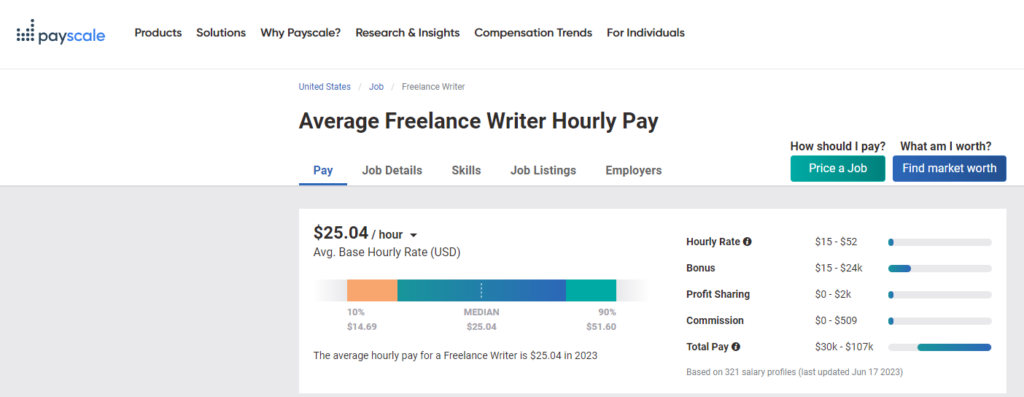
An efficient tool worth noting for setting your pricing point is Articly AI which provides key insights into market trends within the field. Armed with this information, you’ll be better equipped when determining your monetary value.
Hence while being mindful of these factors helps frame expectations about earnings as a blog post writer, don’t let numbers deter you from pursuing your passion for writing!
Prize quality over quantity, allowing gradual improvement to steer your path toward bigger opportunities within this exciting profession!
How has the Blog Post Writer Job changed by AI?

The blog post writer’s role has transformed significantly with the advent of artificial intelligence. In my experience, one cannot deny the widespread impact that recent advancements in AI have had on various sectors, including freelance blog writing.
- Error-Detection: First and foremost, AI platforms like Grammarly and ProWritingAid are assisting blog writers in identifying grammatical mistakes, enhancing sentence structures, and providing suggestions for improving overall content quality. Such AI tools can perform a comprehensive grammatical check within seconds, thus speeding up the editing process and ensuring meticulous proofreading once the article is written.
- Content Generation: Secondly, there’s an increasing trend of utilizing AI for content generation. Certain machines can use natural language processing to produce simple articles or snippets for reports. An example is SEOwind – a perfect blend of human expertise and technology.
- SEO Optimization: Thirdly, consider how SEO optimization used to be a manually intensive task often dreaded by many a blog post writer. But now? Keyword analysis tools driven by artificial intelligence suggest relevant keywords to embed throughout the text for search-friendly content – all guestimating work is removed from the equation!
- Improved Research Capabilities: Finally, AI algorithms can extract pertinent information from massive data sets in moments – something only possible before through hours of manual research by professional blog writers.
Considering these points, it’s fair to say that even though AI doesn’t completely replace a human operator due to limits in creativity and understanding complex emotions, it equips them with powerful resources and functionalities.
Therefore while it might seem that our friend ‘AI’ provides competition for traditional blog writers needed around the web—and while it does—its primary function continues to be one of support rather than replacement. Workflow efficiency is dramatically increased as tedious tasks become automated thanks to artificial intelligence applied to blog writing jobs.
How can AI help Blog Post Writers?
As a seasoned blog post writer, you may be intrigued by the surge of artificial intelligence in content creation. Its promise of automation and efficiency enhancement might raise questions on how exactly it can aid you. Let’s dive into this fascinating topic.
To begin with, AI can streamline tedious aspects of writing tasks, allowing writers to focus more on creativity and strategy. Tools like Grammarly, for example, employ artificial intelligence to proofread your work, offering spelling and grammar corrections. Software such as AI Blog Writer goes further; they provide content suggestions or even write full long-form articles.
Secondly, think about time optimization. Automation tools such as an ‘AI Blog Writer’ simplify scheduling and posting across multiple platforms, ensuring punctuality is one thing off your worry list.
Moreover, the emergence of ‘AI blog writing’ has seen software capable of generating briefs or producing entire drafts using Machine Learning algorithms. While these usually need a human touch for final refinements, they’re impressive time-savers.
Contrary to certain perceptions, AI blog writers don’t aim to replace us human writers but rather complement our capabilities. As a professional blog writer embracing these revolutionary technologies could lift your productivity levels dramatically while still allowing ownership over the creative process.
Finally, AI assists in data analysis through SEO optimization tools that reveal what your readers are searching for online. Platforms like SEMrush and Buzzsumo utilize intelligent algorithms to provide key insights on keyword density and popular trends that inform topical choice and SEO strategy.
In summary,
- Streamlines mundane facets, enhancing creativity
- Optimizes time involved in scheduling posts
- This means an impressive time-saver through algorithm-based draft production
- Complements writer’s capability rather than replacing them
- Assists in data analysis driving better SEO decisions
That’s just a snippet of how artificial intelligence stands poised to transform the life of a modern-day blog post writer. Get ready to embrace this powerful assistant in enhancing your productivity scores!
SEOwind – the best AI Blog Writer
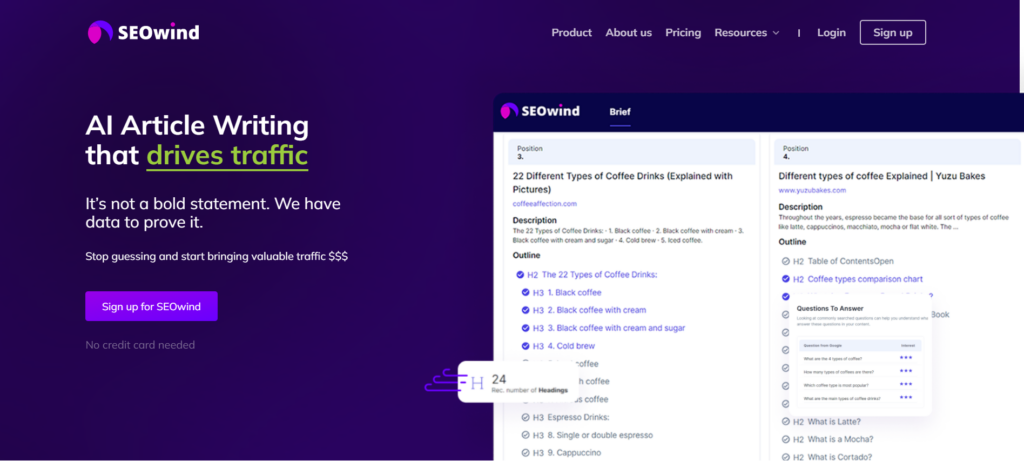
SEOwind is the ultimate tool for AI-powered, high-quality long-form blog posts writing. Unlike generic AI offerings, SEOwind’s blog pieces are robust, richly informative, and distinct.
Here’s why SEOwind can help drive your traffic and conversions:
- Superior Quality: Each SEOwind article begins with a comprehensive and meticulously researched outline, so your content is substantively valuable and relevant.
- Comprehensive and Detailed Inputs: We feed about 7k words of unique prompts for every 3k words of content generated, ensuring your articles are in-depth and engaging.
- SERP-Focused: SEOwind is not a random content generator. Our algorithm studies the top-ranking content in SERPs (Search Engine Results Pages) to understand what works, enabling your content to rank higher and meet intended search interests accurately.
- SEO-Optimised: Each SEOwind article incorporates relevant keywords based on high-ranking content, effectively applying SEO best practices. As a result, our AI-written blogs enhance your visibility on search engines, leading to increased organic traffic and, eventually, higher conversion rates.
If you power up AI articles written with SEOwind with CyborgMethod™, then you can achieve amazing results – rank higher in search engine results, and grow your online business presence
Use CyborgMethod™ to get superpowers as a Blog Post Writer
Almost like a trigger phrase for writers, the term “CyborgMethod™” can unlock extraordinary abilities in your approach to writing. Adopting the CyborgMethod involves leveraging AI technologies to become a more potent blog post writer.
In practical terms, you’re meshing human creativity and emotional intelligence with machine speed and processing capability. Think of yourself as embodying the best aspects of both worlds. Like walking hand-in-hand with a powerful ally who is there to ensure you function optimally as a professional blog writer.
Let’s delve into how this plays out in real life:
- Productivity: Machines are famously relentless—they can operate 24/7 without losing efficiency or accuracy. The same cannot be said for humans, unfortunately! By employing AI-powered tools such as article writer service or blog wizard software, redundancy becomes a thing of the past – you’ll have more time to focus on strategic tasks.
- Consistency: Artificial Intelligence is all about patterns; they excel at performing repetitive tasks precisely every time it’s required. As an “articles writer,” imagine having tools to maintain a consistent tone, language complexity, and structure throughout your posts!
- Scalability: If being able to churn out high-quality articles regularly seems like climbing Mount Everest—AI’s got your back! It allows you to easily scale up content production without sacrificing quality.
- Data-crunching: Almost like their second nature—machines are champs at processing massive amounts of data quickly and accurately. As bloggers undertaking thorough research forms a significant part of our process; using AI here helps us save valuable time and resources.
- Instant insights: Some AI tools enable ‘blog writer services’ to gain fast insights into trending topics or suggest popular keywords—which could significantly boost visibility and reader engagement when included in our blogs.
Having these capabilities gives me an edge—it almost feels otherworldly! Yet, it’s important not only lean heavily on technology frills—balancing them with empathy, curiosity, and creative intuition as only natural beings do – thus truly achieving mastery over CyborgMethod™!

Skills and Qualifications of a Blog Post Writer
As you might surmise, the role of a blog post writer isn’t confined to merely putting words on paper. It requires an assorted portfolio of skills and qualifications. Primarily, this list includes writing skills, research abilities, SEO knowledge, social media familiarity, and the increasing ability to leverage AI (Artificial Intelligence).
Writing Skills
The cornerstone for any blog post writer is impeccable writing skills. These are integral not only in commanding attention but also in sustaining reader engagement. A firm grasp of grammar rules is just one aspect of being proficient.
Orthography aside, storytelling is another pivotal skill because few things captivate readers, like a well-told narrative. The goal here is to paint vivid pictures through your words that immerse audiences into your articles. Further, knowing how to tailor your tone to your audience elevates this connection between your content and readers.
Blogging allows writers to experiment with personal voice—authenticity can help build readers’ trust and bolster blog engagement rates.
Research Skills
Next up is research competency, which would allow bloggers to craft accurate and informative content. Whether finding reliable data sources or interpreting recent industry studies, good research provides substance – grounds your ideas in facts, thus enhancing credibility.
Knowledge of SEO
Understanding Search Engine Optimization or SEO strategy determines if the blog will appear among top search results—it puts blogs ‘on the map.’ This entails learning about keywords; these are terms related to your topic that people are most likely searching for online.
Balancing keyword usage versus creating natural-flowing content aids in improving search engine rankings without compromising readability—an often delicate exercise reserved for seasoned professionals.
Social Media Knowledge
While some consider blogging separate from social media platforms, savvy bloggers understand they work best together. In today’s digital age, where virality defines success rates, garnering social media prowess becomes monumental for shareable blog content. Shares amplify reach, after all!
Knowing what works on each platform can drive traffic to the blog site.
Ability to leverage AI
Lastly, yet importantly, we leverage AI technology—a rapidly evolving feature seen more commonly across industries, including blogging.
AI-powered tools can assist with various tasks, such as suggesting topics based on trending themes or even aiding in proofreading tasks by employing complex algorithms designed for accuracy checks faster than humanly possible! Newer technologies like SEOwind have been developing advanced features to enhance overall efficiency.
Bringing it full circle: The amalgamation of these diverse skills makes one competent enough to merit consideration for the title “Professional Blog Post Writer.” From having excellent writing abilities to experimenting with emerging advancements like Artificial intelligence – all attributes lead to comprehensive growth within the said profession.
To get familiar with all the skills blog post writer should acquire go to: Master These Essential Blogging Skills in 2023
Blog Post Writing Process
The journey of creating high-quality content and blog posts is more than just putting words on paper. It involves several critical steps contributing to your article’s overall success.
Brainstorming Blog Post Ideas
To kick off, as a professional blog writer, having an arsenal of creative and intriguing ideas is vital. You might turn to other articles or blog posts for inspiration or rely on keyword tools, trending topics relevant to your niche, audience questions, and competitor analysis to ignite topic discussions. It’s important to take enough time exploring these avenues until you land the perfect starting point for your upcoming post.
Researching the Topic
Once you’ve picked a promising idea, it’s time to dive deep into research. Consulting reputable sources like industry studies, expert interviews, scholarly papers, or verified databases can offer invaluable insights and credible information for your blog post. Keep in mind that replacing assumptions with data-driven facts boosts not only the value but also the trustworthiness of your content.
Outlining the Post
With a wealth of information from meticulous research conducted earlier, constructing an outline comes next. A coherent structure will help guide your writing process and readers’ understanding throughout the piece.
Outlining typically begins with defining section headings that represent main points to address in alignment with your title and keyword use (for instance: “blog writing process”). Subheadings may be added underneath each primary point if further explanation or detailed discussion is required.
Writing The Post
In this phase – crafting actual text – it’s time for your distinctive voice as an individual blogger and masterful command of language to shine through compelling words. Strive for clarity in every sentence while preserving reader engagement; avoid overly complex language where simple expressions would suffice.
Remember to always reanalyze around tying elements within paragraphs onto clearly defined headings/subheadings mapped out initially in your previous outline to ensure seamless readability.
Editing and Proofreading The Post
Once that final word hits, it doesn’t mean your job is over. Rather, it shifts into another essential stage – editing and proofreading. At this juncture, meticulously combing through content and searching out typographical errors, grammatical missteps, or awkward phrasing stands crucial in achieving polished work.
Additionally, utilizing AI-powered tools such as Grammarly for mechanical fixes and a personal oversight perspective creates immeasurable leverage. Always read through multiple times, swapping lenses between a stringent editor trying to spot flaws versus an eager reader looking forward excitement from enlightening content discovery experiences gets rewarded by all their expectations being met without any pesky interruptions disturbing smooth literary indulgence.
Types of Blog Posts
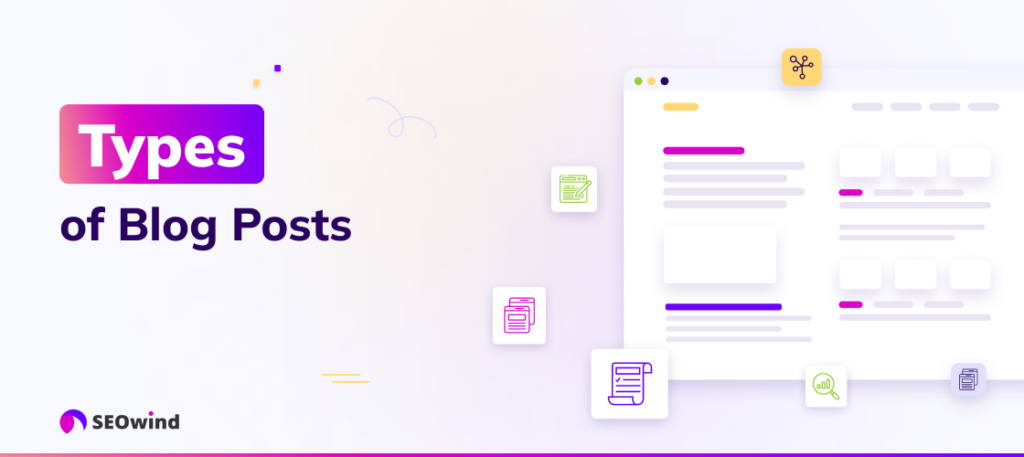
As a seasoned blog post writer, you must understand the different types of online articles and posts you can create. Each variety caters to diverse reader needs and helps to diversify your content offering. While there are numerous styles, let’s elaborate on four key types – Informative posts, How-to articles, Opinion pieces, and Interview blogs.
Informative Posts
Informative posts form the backbone of many blogs. They impart knowledge or provide valuable details about specific topics. Typically featuring facts, statistics, or even groundbreaking original research findings – they maintain a professional tone.
These articles hold immense value for blog readers seeking information on particular subjects. As an article writer service provider, you might need to dedicate resources responsibly for thorough research before crafting these posts.
How To Posts
How-to articles break down complex procedures into manageable steps anyone can comprehend and execute. These readily actionable guides benefit users as they offer solutions (often illustrated with real examples) to common challenges – making them highly sought after by readers keen on learning new skills or tackling projects.
Opinion Pieces
The refreshing perspective of opinion pieces comes with an endless stream of identical-seeming information online. In contrast with more sterile styles like informative posts, these allow for personality injection and unique insights into various topics.
- Personal standpoints or commentary brings forth lively discussions amongst readers while broadening their perspectives simultaneously. Just ensure maintaining respectability; a personal attack isn’t generally well received.
Interview Posts
Culminating our listing today are interview-style blogs – one-on-one conversations between blog writers and industry figures/experts. Candid replies married to open-ended questions often serve up engaging narratives that your audience would savor immensely!
- Given this angle’s uniqueness – Direct responses from personalities held high within their fields – such content inevitably draws large audiences due to exclusive insights in these dialogues.
Altogether each archetype offers something distinct yet equally valuable depending on what your audience desires at a particular moment. Remembering this as a professional blog writer will surely guide you toward fulfilling diverse user needs effectively and efficiently!
Blog Writing Tips
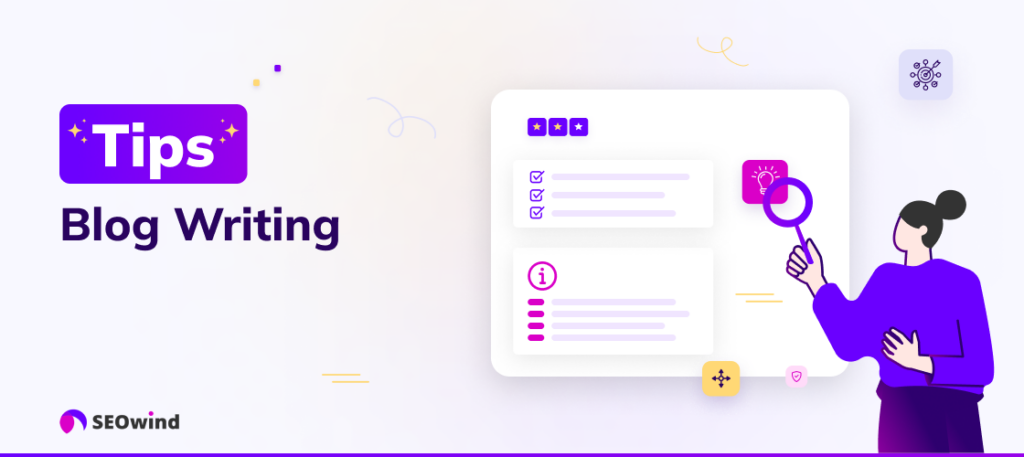
In professional blog writing, it’s essential to remember certain key elements. These can differentiate a good blog post from an exceptional one. Implementing these tips into your writing process can enhance your repertoire as a prolific blog post writer.
Write with Clarity and Brevity
Writing with clarity involves being succinct but also impactful. As bloggers, we must ensure our message is understood without ambiguity. The power of brevity in blog writing should always be considered; it does not imply insufficiency. In fact, according to George Orwell in his essay “Politics and the English Language,” brevity is fundamental for effective communication. It’s about saying exactly what needs to be said — no more, no less — while retaining reader engagement.
A few strategies include:
- Using simple words when possible.
- Eliminating redundant phrases.
- Breaking down complex blog post ideas into smaller, easily digestible parts.
Use Headings and Subheadings
Our online readers have short attention spans. A well-placed heading or subheading serves two purposes: it breaks up text blocks, creates visual relief, and allows skim-readers to locate sections relevant to their interests quickly.
Headings needn’t be dull, either. Charm your readers’ by making them interesting and compelling enough to proceed further! Ensure they tie together coherently and form a logical flow representing an organized structure within your blog post.
Include Examples and Visuals
Concrete examples strengthen abstract concepts allowing for better comprehension, whereas visuals are powerful tools that can supplement the written word content. Research suggests visuals are processed 60,000 times faster than text (3M Corporation). Thus incorporating images, infographics, or videos related to the subject matter enhances appeal while serving explanatory functions.
For instance: if you’re discussing complicated topics like AI blog writing software, don’t just tell me about such software – show me how it works!
Remember: -Always use high-quality images -Make sure visuals add value & relate directly to the written page content -Cite sources correctly; Respect copyright laws!
Optimize for SEO
To increase visibility amongst potential followers, effectively leverage SEO strategies while crafting posts. Identify keywords— both long-tail versions (e.g., AI-powered professional blog writer) as well as shorter ones (e.g., freelance/blog/article writers)
Well-researched primary/LSI keywords should instill naturally throughout rather than force-fitted merely for optimization’s sake; it’s always ‘user experience first.’ Moreover, incorporate links – internal (to own website) & external (to authoritative sites). This dual strategy reduces bounce rates + improves the site’s reputation respectively.
Ultimately maintaining authenticity & purpose within your posts will yield the most success despite algorithmic updates thrown our way by search engines over time.
Write Compelling Headlines
Crafting compelling headlines is the first technique to draw attention to your blog post. 80% of readers never make it past the headline (Source: Copyblogger). Therefore, as a professional blog writer, spending time on this aspect is not negotiable.
- Use power words: Words like “Ultimate,” “Powerful,” or “Essential” can offer your post a unique emotional appeal.
- Make it valuable: Express clear benefits in your headline. Answer the reader’s question: ‘What’s in it for me?’
- Keep it concise: Search engines often truncate long headlines. Aim to keep yours under 60 characters.
- Add numbers: Studies have shown that headlines with numbers tend to generate more traffic.
These strategies will help ensure your article is noticed amongst the surplus of online content.
Create an Emotional Connection with Readers
Next up is establishing an emotional bond with our audience; this adds meaning to their reading experience and motivates them to come back for more engaging posts from you:
- Be relatable: Show empathy toward common challenges that your target audience faces.
- Share personal experiences: Authentic stories spark interest while illuminating your unique perspective.
- Visual storytelling: Incorporate relevant images and infographics that complement your narrative.
- Foster Community Engagement: Respond promptly and respectfully to readers’ comments, questions, and suggestions.
Creating engaging content requires strategic writing combined with creative techniques such as compelling headlines and emotional involvement from readers – thereby ensuring lasting resonance amidst information overload!
